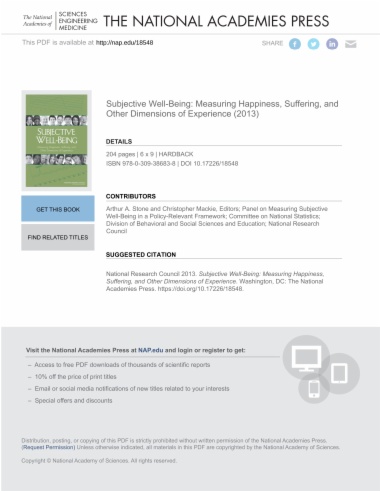

Subjective well-being refers to how people experience and evaluate their lives and specific domains and activities in their lives. This information has already proven valuable to researchers, who have produced insights about the emotional states and experiences of people belonging to different groups, engaged in different activities, at different points in the life course, and involved in different family and community structures. Research has also revealed relationships between people's self-reported, subjectively assessed states and their behavior and decisions. Research on subjective well-being has been ongoing for decades, providing new information about the human condition. During the past decade, interest in the topic among policy makers, national statistical offices, academic researchers, the media, and the public has increased markedly because of its potential for shedding light on the economic, social, and health conditions of populations and for informing policy decisions across these domains.
Subjective Well-Being: Measuring Happiness, Suffering, and Other Dimensions of Experience explores the use of this measure in population surveys. This report reviews the current state of research and evaluates methods for the measurement. In this report, a range of potential experienced well-being data applications are cited, from cost-benefit studies of health care delivery to commuting and transportation planning, environmental valuation, and outdoor recreation resource monitoring, and even to assessment of end-of-life treatment options.
Subjective Well-Being finds that, whether used to assess the consequence of people's situations and policies that might affect them or to explore determinants of outcomes, contextual and covariate data are needed alongside the subjective well-being measures. This report offers guidance about adopting subjective well-being measures in official government surveys to inform social and economic policies and considers whether research has advanced to a point which warrants the federal government collecting data that allow aspects of the population's subjective well-being to be tracked and associated with changing conditions.